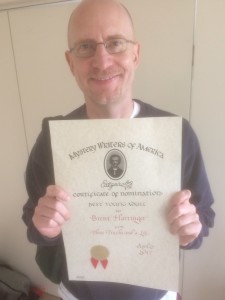Brent Hartinger's Blog
January 16, 2018
I Wrote a Book Set in a Place I’d Never Been To, Then I Visited That Place. How’d I Do?
My last novel, The Otto Digmore Difference, was a road trip story about Russel Middlebrook and his friend Otto Digmore traveling from Los Angeles to New Orleans, so that Otto, an actor, can get to an all-important movie audition on time.
Here’s a little secret that I shouldn’t be confessing: I’d never actually driven most of the roads that Otto and Russel travel. I once lived in Los Angeles (where the book begins), and I’ve been to the Garden District in New Orleans (where the finale of the book is set), but I’ve never been to most of the places in between, including the road from Texas into Louisiana. The town of Bluke? I made that town up entirely, in part because I didn’t want to insult a specific place that I hadn’t actually visited.
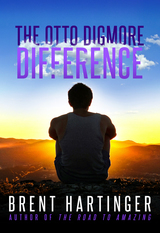 I make two excuses: (1) This is a road trip story, but it’s really more of a relationship story (between Otto and Russel) than being about the actual locations they visit, and (1) I’m not rich enough to be able to afford to travel to every place I write about!
I make two excuses: (1) This is a road trip story, but it’s really more of a relationship story (between Otto and Russel) than being about the actual locations they visit, and (1) I’m not rich enough to be able to afford to travel to every place I write about!
So how did I write about places I hadn’t physically visited? I used a combination of online research and, well, Google Earth. Yup, I traveled everywhere that Otto and Russel did, but I did it virtually.
By the time I was done with the novel, I felt pretty confident that I “knew” these roads and towns. But honestly? I didn’t know for a fact I was right. Places can look one way on Google Earth, but they can look completely different in person. And then there are subtle things that Google Earth could never capture, at least not yet: smells and other little details.
Last week, I happened to be driving across the country, following much of the exact same path that Russel and Otto took.
I couldn’t help but ask myself: How did I do?
Here’s the God’s honest truth: I didn’t make any specific errors. In fact, I was shocked by how much the roads and towns look like I described. It was kind of strange feeling like I’d been there before. I felt a little swell of smug pride.
But. Yes, there’s definitely a big but.
The longer I spent there, the more I absorbed a zillion little details that I wish I had included in the book: the way the pavement of the freeways looks like it’s been bleached white in the sun, the dryness of the dust in the air, the way some of the bridges rise up over the swamps like steep parabolas.
It’s true I included other specific details that I’m very proud of, things that hopefully make the book feel like it’s set in a very specific place, like it’s a real journey that these characters took (and I’m still very, very proud of the book itself).
That said, if I had to do it all over again, I wouldn’t mind including these details that ground it in the actual place where it’s set.
Live and learn. The circumstances of this book were somewhat unique. Will I do it again, writing a book set in a place I’d never visited?
No, not if I can help it.
CHECK OUT THE OTTO DIGMORE DIFFERENCE HERE
 Send to Kindle
Send to Kindle
December 29, 2017
“Don’t Leave the Mirkword Trail!” A Master Class in Good Writing
Warning: This post contains spoilers for The Hobbit book and movie.
When I read The Hobbit as a kid, the sequence in Mirkwood Forest really stuck with me.
Bilbo and the company of dwarves are desperate to get to Lonely Mountain, in order reclaim a great treasure. But to get there on time, they must past through an ancient (and very dangerous!) forest called Mirkwood.
The wizard Gandalf suddenly has pressing business elsewhere — of course! — and he can’t accompany them into the wood (in fairness to Gandalf, he has already saved their butts quite a few times). The good news is that mystical elves once created a magical pathway through the forest that still exists, allowing travelers to avoid the dangers in the trees. Before Gandalf departs, he gives them stern advice: “Don’t stray off the [path]—if you do, it is a thousand to one you will never find it again and never get out of Mirkwood; and then I don’t suppose I, or any one else, will ever see you again.”
In my mind, this is just a fantastic set-up. It’s obviously a “character” test of sorts.
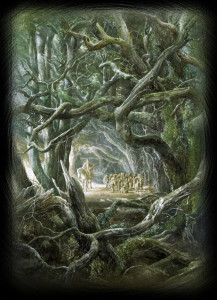 And, of course, it’s also a great fantasy genre bit. Some impossibly old forest full of ancient evil that is held back by powerful, but fading elf magic? How will our inexperienced and mostly non-magical hero and his friends survive this peril?
And, of course, it’s also a great fantasy genre bit. Some impossibly old forest full of ancient evil that is held back by powerful, but fading elf magic? How will our inexperienced and mostly non-magical hero and his friends survive this peril?
As a kid, I remember thinking, “There is no way I would ever leave the forest path, no matter what happened!”
So how does the sequence actually play out? It’s a master class in good writing, so let’s unpack it, shall we?
The first thing the adventures learn upon entering the forest is that the path is very, very narrow. So narrow, in fact, that they must walk single-file. That immediately ups the challenge of never leaving the path, doesn’t it?
At first there is light through the trees, but almost right away, it’s all but cut off. So now the path is narrow and dark. There is just enough light to see impossibly thick cob webs (which is great foreshadowing). But the webs are somehow kept off the path itself by its magic. The adventurers are safe … for the time being.
Then the claustrophobia sets in. The party starts to feel like they’re being suffocated, even the dwarves who are comfortable being underground. It’s even worse at night when strange, unidentified creatures stare out of the darkness with red and yellow and green eyes. And even — shudder — the pale eyes of what seem to be giant insects! But whenever they shine the light into the trees, the creatures slip off into the shadows. Worse, their lights attract horrible giant months.
Great atmosphere, huh? At this point, it should also be clear that the forest itself is the antagonist for this part of the story, and it’s a damn good one.
That said, Bilbo and company are still protected by the magic of the forest path. The wood is certainly creepy, but the danger still can’t actually touch them. So as long as they keep their wits about them, and follow Gandalf’s advice, they might be okay.
Then the path comes to a bridge over a stream … and the bridge is out! There’s a boat that can be used to cross, but — wouldn’t you know it? The boat is on the other side of the water.
Please note what Tolkien is doing here, how cleverly he is ratcheting up the tension: the characters have no choice but to leave the path, at least to try to get across the river.
The boat doesn’t even look like it’s tied up on the other side, so if they were to throw a grappling line across, they might be able to get it.
In other words, the forest is tempting them: You’re not really leaving the forest path! You’re just trying to get the boat, so you can continue on.
Suddenly the vow I made as a kid — that I would never leave the path, no matter what happened! — now seems a bit more difficult to keep; everyone’s expectations are nicely thwarted. Sure enough, getting the boat proves much easier said than done. Then when they finally do get the boat to their side of the river, it doesn’t have oars!
They do eventually manage to get across the river and are about to step back onto the path. Whew! But at that second, a deer bolts from the forest, surprising Bombur, who falls back into the water. Which is, of course, enchanted by the evil of the forest.
Despite their best intentions, the party has now left the path. Is that enough to ruin everything? The tension goes higher still.
They continue on, but the evil of the forest has breached the party. Slowly but surely, their despair begins to eat at them. They even send Bilbo to the top of a tall tree to see how much farther they have to go. Tolkien tells us they’re actually not that far from the end, but they’ve chosen the wrong tree (or perhaps the forest has guided them to the wrong tree!), and from there, their journey looks all but hopeless.
Next they run out of food, and as the days go on, they begin to starve. Now the forest tempts them with the sounds of a nearby hunting party, and the delicious smells of roasting meat, seemingly not too far off the path.
Finally, they agree to leave the path together in search of food. (Small quibble: I think even now it should have taken more than this, a bit more infighting at least, to get them to voluntarily leave the path. But hey, he’s J.R.R. Tolkien, and I’m not.)
And by leaving the path, things naturally go from bad to worse: from giant spiders, to vengeful wood elves. They eventually do get out of the forest again, thanks to Bilbo’s quick thinking — perhaps they were the one in a thousand Gandalf was talking about.
All in all, it’s a terrific sequence in a terrific book! It haunted me as a kid, and I still love it now.
But I confess: I was very disappointed in how this was dramatized in Peter Jackson’s movie adaptation, The Hobbit: The Desolation of Smaug. It looks pretty amazing, and I do love the addition of the cool elven gate at the beginning of the forest (not in the book). But as is typical of The Hobbit movies, they go way over-the-top, immediately turning the forest into a kind of Escherian stairway. It’s too much, squandering the subtle build of the book’s rising tension.
Even worse, it violates that great rule that has been laid out for the characters (and the viewer): the characters are safe as long as they don’t leave the path. Here, Bilbo and company quickly become so groggy and confused that the spiders basically attack them on the path.
As I said, the whole narrative point of Mirkwood is that it’s a character test: Can they resist giving into temptation and despair? Instead, the movie plays it like a silly set piece.
 Send to Kindle
Send to Kindle
October 25, 2017
ATTENTION! Calling Beta-Readers (For a New Book of Mine)!
Interested in seeing a preview of an upcoming book of mine? Be a beta-reader! That means I send you a copy of the book (as a WORD file), you read it, and then tell me what you think. Since this is an early draft, I’ll rewrite it based, in part, on the feedback I get from beta-readers. When it’s published (in 2-3 years), I’ll send you a signed copy (if you’re in the U.S.).
So what’s the book? It’s a book I co-wrote with my husband Michael Jensen, a middle grade fantasy/adventure novel (for kids age 8-12). It’s called The Lost Lands, and it will hopefully be the first book in a series, Portals to Adventure.
In the book, Mateo, Ben, and Ava, three lonely twelve-year-olds, meet in a Disney World-type amusement park called Portals to Adventure, which has five make-believe “portals” that go to one of five different fantastical “lands.” But when the three kids get lost in the tunnels underneath the park, they discover that these five mythical lands are based on actual worlds which have been secretly influencing ours for centuries (and visited by people such as Jules Verne, Socrates, and J.M. Barrie). The park, created by a Willy Wonka-like genius named Cassandra Blaze, exists to gradually introduce our world to the existence of these other worlds. Unfortunately, a secret society called the Inquisitors wants to exploit these other worlds, and is determined to keep information about them from ever getting out.
Before long, Mateo, Ben, and Ava find themselves sucked into the first of these worlds, The Lost Lands, which is the real home to the Fountain of Youth and the city of El Dorado. Soon they’re in a race against time to stop the Inquisitors from unleashing a terrible force into our world.
Sound intriguing? Drop me an email, and I’ll send you a copy!
 Send to Kindle
Send to Kindle
I Love Fantasy, but I Truly Hate a Lot of Fantasy Tropes
So I’ve been working on a couple of different fantasy books — it’s a genre I absolutely adore.
But like any genre, there are a zillion tired tropes. For example, I can’t STAND the whole idea of the “Chosen One” — someone who, usually by virtue of their family background, is destined for greatness. The prophecies all say so!
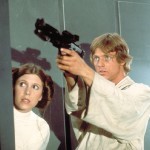 I’ve hated this trope as long as I’ve been alive. The Force runs strong in the Skywalker family? Harry Potter is a celebrity at the start of his story, destined to kill Voldemorte (or die trying)? Frodo must destroy the One Ring that his cousin/uncle brought back from his adventures, redeeming the family name?
I’ve hated this trope as long as I’ve been alive. The Force runs strong in the Skywalker family? Harry Potter is a celebrity at the start of his story, destined to kill Voldemorte (or die trying)? Frodo must destroy the One Ring that his cousin/uncle brought back from his adventures, redeeming the family name?
Where does all this leave the rest of us? We’re supposed sit back and let the Chosen One complete his destiny? If we’re lucky, we might get to help?
Oh, goody.
This annoys me because it’s so clearly based on the idea of royalty: that some family lines are simply better than other ones. They’re chosen by God, or the gods, or Destiny itself. (Often, this is couched in the idea that this greatness is some kind of unbearable “burden,” often one that must be kept hidden from the ignorant rabble, but that’s mostly just a bunch of bunk. From the point of view of all these stories, the main character is the “cool” kid, even if the actual cool kids can’t see it yet.)
But I believe to the core of my being that greatness is democratic: it’s damn hard, but it’s available to ALL of us.
For the record, I will NEVER write a Chosen One story. If anything like the Force exists in any of my stories, it’s available to EVERYONE, regardless of lineage.
Another fantasy trope I hate is the idea that everything was always so much better in the past. Back then, everyone was in touch with nature, and magic was real. There was all this GREAT WISDOM.
But then nasty old Science came along and screwed everything up!
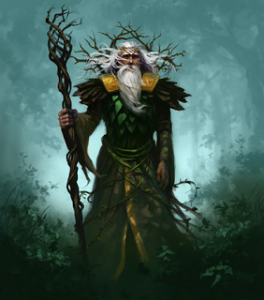 I get what writers are going for here: there is a loss that’s part of the modern world. There can also be an arrogance to science: the idea that any question can be asked.
I get what writers are going for here: there is a loss that’s part of the modern world. There can also be an arrogance to science: the idea that any question can be asked.
But I think this whole trope is based in false nostalgia, the same impulse behind Trump’s “Make America Great Again.”
Here’s a reality check: the actual past was almost uniformly brutal and ugly, and prejudice of all kinds was widespread. Wisdom? Sure, there was obviously some, but the reality is that most Ancient Beliefs were mostly a combination of ignorance and superstition.
Science isn’t perfect, but it’s a thousand times better than anything that came before it. If you think science is arrogant, what about the whole notion of divinely revealed truth (which is basically all that existed before science)? You’re so arrogant you think you know the will of God? You think you know the secrets of the universe?
Please. That seems delusional to me. Let’s respect the past for what it is, and let’s appreciate the moment’s of greatness in human history. But let’s not romanticize it. Let’s not pretend that for the vast, vast majority of people, this isn’t the best moment in time to be alive. More freedom, better health, longer life-span, more knowledge. It’s not even close!
So there you go. I’m a fantasy author, but I’m frustrated by two of the genre’s major tropes.
The good news, you’ll never see either of these tropes in my work!
 Send to Kindle
Send to Kindle
August 7, 2017
THREE TRUTHS AND A LIE is Out in Paperback (with a Cool New Cover)!
So my book, Three Truths and a Lie, is out today in paperback! And it has what I think is a GREAT new cover. Check it out:
 Send to Kindle
Send to Kindle
June 7, 2017
How Many Times was GEOGRAPHY CLUB Rejected Before it was Published? It’s Complicated
A reader just asked me if minded telling how many publishers rejected Geography Club before it was finally published.
I don’t mind answering at all, but it’s a bit complicated, so when I give presentations, I usually just say, “38 publishers!”
Here’s the full story, which I’ve never before told in public, precisely because it is so complicated.
I wrote my first gay teen novel in 1989, right after college (I graduated young — I’m not THAT old!). The book was about a guy named Russel Middlebrook, who was a lot like Russel, and he had a best friend who was a lot like Gunnar. But there was no Min, no Kevin, and no Geography Club; the story was very different. It was about a closeted gay guy and his friendship with his gay swim coach. But it wasn’t a love story; it was a story of his coach being outed and the kid eventually coming to terms with being gay himself.
It was called Danny Britton’s Shadow. At one point, Russel’s coach tells a story about how he had always felt like he was in the shadow of the smartest, best kid in his class, Danny Britton. Until, of course, he learned that Danny Britten felt exactly the same way about him. In other words, the whole world lives in Danny Britton’s shadow, even Danny Britton! Everyone goes through life feeling like they’re not good enough.
All through the 1990s, I tried to sell this book to publishers.
Around 1995, the book won the SCBWI Judy Blume Grant for Unpublished Novels. I got a very nice note from Judy Blume herself, and the manuscript was requested by something like twenty-eight different editors. Three of them wanted to publish it and took it to the acquisitions departments at their publishing houses. But the accountants all said the same thing to those editors, “NO! There’s no market for a book about gay teens! You can’t publish it!”
I got increasingly frustrated/depressed, so much so that I eventually said, “To hell with it! I’m putting this aside and focusing on other books and my screenplays.” Around this time, I also moved to Hollywood where I had a couple of screenplays optioned and a play produced. (But none of the movies ever got made.)
Around 1998, I got a new agent, Jennifer DeChiara. She looked at all the stuff I’d written and said, “I like this Russel Middlebrook stuff best. I think I should pitch that.”
But I said, “Forget it! I’ve already tried everything. Everyone says the same thing: there’s no market for a book about gay teens.”
She said, “Trust me.”
I said, “Okay, but this manuscript isn’t as good as what I’m writing now. Plus, times have changed so much — I don’t think this book is as relevant as it used to be. Let me rewrite it.”
She said, “Just put together a proposal.”
I said, “I don’t need to write the whole book?”
She said, “No, just a proposal.”
So I wrote a book proposal for Geography Club: one chapter and a detailed outline. I did two things that I think were key to the book’s future success: (1) Danny Britton’s Shadow had been really angst-y, but I tried to make Geography Club lighter and funny, and (2) I decided that it wasn’t going to be a story of self-discovery, it was going to be, in part, a love story. Even though he was closeted, Russel was going to know from the very beginning that he was gay and that he was totally okay with it. There would be absolutely no shame or self-hatred, because that already seemed very dated to me.
Geography Club literally started where Danny Britton’s Shadow had ended.
This proposal is what my agent took out to publishers. Thirty-eight of them eventually turned it down. But in early 2001, one editor, Steve Fraser at HarperCollins, made us an unusual offer: he said he would buy the proposal for a $5000 advance (and I’d then write the book on their dime), or I could wait and submit the whole book, and if they liked it, the advance would be $10,000.
Well, a bird in the hand is worth two in the bush, so I took the $5000. My agent, who always had complete confidence in this book, said, “You’ll make much more than that in royalties, so don’t worry.”
I was so worried that they were going to cancel the deal that I sat down and wrote the whole book in two and a half weeks. I’ve never written that fast before, or since. The day the contract was signed, I submitted the completed manuscript.
Steve had a few (good) suggestions, but this manuscript was very, very close to the book that ended up being published. It’s the least-edited book I’ve ever written. And, perhaps not surprisingly, this is probably also why there are a zillion things I now wish I could change. (Not really. Well, sorta.)
But please don’t think Steve wasn’t enormously helpful. He just gave me his best notes in the pre-contract, proposal stage, when we’d informally chatted about the book before it was even written. For example, in the original outline, Brian Bund commits suicide at the end of the book.
Steve said, “Please don’t do that. It’s way too serious, and it will change the book into something completely different.”
And he was so unbelievably right! Brian Bund’s suicide was a classic “deus ex machina” — a way to resolve my story that seemed profound, but was actually a total plot cheat. And tonally, it didn’t fit in there at all. I’d like to think I would have seen that on my own without Steve’s input, but I was pretty thick back then: I’m not sure I would have.
Incidentally, a side-note: the idea that an unpublished writer can submit a book proposal for a novel — especially a proposal that only includes ONE chapter! — and sell it to a major publisher is actually downright crazy. In fact, it may never have happened to anyone else in the entire history of publishing, before or since. But I’d won that award, and Steve and those other editors had read a couple of my other books, including Danny Britton’s Shadow. They knew I could write, and finish projects, so it wasn’t quite the risk that it maybe seems. And, of course, the subject matter was unusual back then — not a lot of people were writing gay teen novels because there was “no market,” remember? And the business of publishing was very, very different back then too.
The greater point is, there are rules in publishing, but there aren’t really any “rules.” Everyone’s path to publication is different (and oftentimes it’s downright crazy)
So anyway, the book was finished by May 2001, but then delayed a loooooong time. This really upset me at the time. And at the end of 2001, one of the editors at Simon & Schuster who had tried (and failed) to buy Danny Britton’s Shadow released Alex Sanchez’s Rainbow Boys. I loved the book, but I also thought, “Well, damn! That’s it, they’ve totally stolen my thunder!” Even I was thinking, “There can’t possibly be room for two gay teen novels in the world!”
I know, right? How stupid was I? (Sara Ryan also published a good lesbian-themed book around that time, Empress of the World. And I don’t mean to imply there weren’t other LGBT teen books before that, because there had definitely been a few, although most of them were long out of print.)
So anyway, about two years after the book was accepted (and almost fifteen years after I wrote the earliest draft), the book was finally published. It was March 4, 2003.
By the end of the second week, it had already gone into a third printing. It went on to sell … well, I’m not supposed to ever say exact sales figures, but many, many tens of thousands of copies.
The movie rights were almost immediately optioned (even though it would take another ten years before the movie actually got made). And I adapted the book into a stage play that’s been produced at least 15 times; I actually think the play is quite a bit better than the book, and I don’t think it’s ever not gotten a standing ovation. It often sells out too.
And my agent says that she heard from lots and lots of editors who said, “Why didn’t you send the book to me? I totally would have bought it!”
Uh huh, right.
As most of you know, I also turned the book into a four-book series, the Russel Middlebrook Series. And then I wrote another series about Russel in his twenties, Russel Middlebrook: the Futon Years. And then just this year I started a new series about one of Russel’s best friends, The Otto Digmore Series.
The moral of the story? I’m not sure there is one, except that gay teen novels, which are so popular now, were a really, really hard to sell in the 1990s.
And that when it comes to publishing, there are no rules and no one knows anything at all.
 Send to Kindle
Send to Kindle
June 3, 2017
Meet Me TODAY (Saturday June 3rd) at Eagle Harbor Books on Bainbridge Island
Near Bainbridge Island (in Washington State)? Meet me today (Saturday, June 3, 2017) at Eagle Harbor Books from noon to 2!
 Send to Kindle
Send to Kindle
May 12, 2017
What Happened at the Edgar Awards? Plus, the GEOGRAPHY CLUB TV Series
What’s going on with my career lately? In my latest Media Carnivores podcast, we discuss my recent trip to New York for the Edgar Awards (where I was nominated for my book Three Truths and a Lie, but did not win), as well as the upcoming pilot for the Geography Club TV series, and several new film projects I’m writing.
 Send to Kindle
Send to Kindle
What Happened at the Edgar Awards? Plus, the GEOGRAPHY CLUB TV Series!
What’s going on with my career lately? In my latest Media Carnivores podcast, we discuss my recent trip to New York for the Edgar Awards (where I was nominated for my book Three Truths and a Lie, but did not win), as well as the upcoming pilot for the Geography Club TV series, and several new film projects I’m writing.
 Send to Kindle
Send to Kindle
April 23, 2017
I’m Off to New York for the Edgar Awards! (I’m Nominated by my Novel THREE TRUTHS AND A LIE.) Come Meet Me
My gay teen thriller Three Truths and a Lie is nominated for an Edgar Award, and I’m off to New York to the ceremony, where I’ll see if I won.
In New York this week? I’ll be making two public appearances:
Wednesday, April 26, 2017, 1-2 PM: Edgar Week Symposium, Nursery Noir Panel, Grand Hyatt Hotel
Wednesday, April 26, 2017, 6-8 PM: Books of Wonder Bookstore: 18 West 18th St, New York, NY
 Send to Kindle
Send to Kindle



